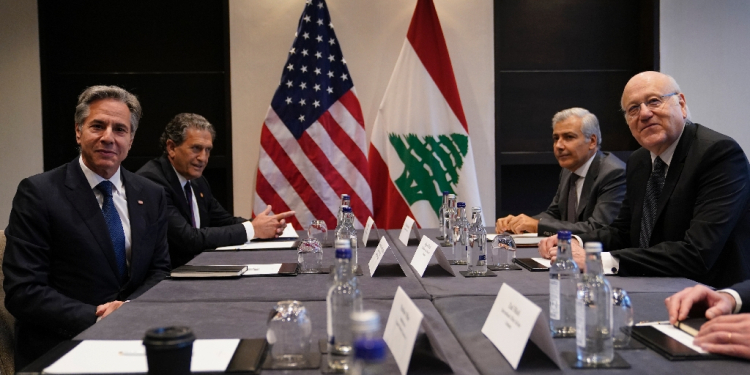(AFP) – US Secretary of State Antony Blinken vowed Friday to work with “real urgency” for a diplomatic resolution to end Israel’s offensive in Lebanon but said it was first critical to reach understandings on disarmament of Hezbollah.
Shortly after meeting Lebanon’s Prime Minister Najib Mikati in London, Blinken also pleaded for protection of civilians but stopped short of urging an immediate ceasefire by Israel, which relies on US diplomatic and military support.
“We have a sense of real urgency in getting to a diplomatic resolution and the full implementation of UN Security Council Resolution 1701, such that there can be real security along the border between Israel and Lebanon,” Blinken told reporters, saying he was “intensely engaged.” Resolution 1701, approved in 2006 after an earlier war, calls for the disarmament of non-state groups in Lebanon — an allusion to Iranian-funded Shiite movement Hezbollah, which effectively runs its own military — and for a full Israeli withdrawal from the country.
Blinken said it was critical to “get the understandings that are necessary for the full implementation of 1701.” “The sooner we’re able to do that, the sooner we’re able to get a resolution,” he added. He called for protections in the meantime of both civilians and Lebanese soldiers, at least 11 of whom have died since Israel launched its offensive a month ago.
“We want to make sure that in places like Beirut, there is a real effort to make sure that people are unharmed and civilians are not caught up in this crossfire,” Blinken said.
– Peacekeepers –
The United States has called for the empowerment of the Lebanese Armed Forces and the fragile central government in Beirut so they can take charge of security and sideline Hezbollah. Blinken voiced support for UN peacekeepers stationed in Lebanon who have repeatedly reported coming under fire from Israel. The State Department said that in the meeting, Blinken “expressed support for the UN Interim Force in Lebanon and underscored that the safety and security of their personnel is essential.”
Mikati and Blinken also discussed the search to name a president of Lebanon, a position vacant for almost two years in the communally diverse country amid deadlock between Hezbollah allies and adversaries including the Christian Lebanese Forces party.
The Lebanese premier headed from London to Dublin for talks with his Irish counterpart Simon Harris. Ireland had 351 peacekeepers serving with UNIFIL in Lebanon as of October 20, according to the UN.
Harris told reporters that the security, well-being, and safety of Irish peacekeepers was of “absolute paramount importance” to Ireland — and Israel needed to recognise they are protected under international law. He said he told Mikati that Ireland “knows all too well” the need to have a political process to bring peace and stop younger generations falling into the “clutches of a terrorist organisation.”
The State Department quoted Blinken as saying that Hezbollah and Iran’s clerical state “must not stand in the way of Lebanon’s security and stability.” Mikati, attending a conference on Lebanon on Thursday in Paris, said that only the state and Lebanese army should carry arms.
Hezbollah has fired missiles at Israel in solidarity with Hamas since the Palestinian group’s October 7, 2023 attack, which triggered Israel’s massive military assault in Gaza. Mikati made no remarks before the press when meeting Blinken or after meeting Harris.
Jordanian Foreign Minister Ayman Safadi, meeting separately with Blinken, told him that Lebanon’s government has made clear it will implement Resolution 1701. “The aggression on Lebanon has to stop immediately. Nothing justifies its continuation,” Safadi said.
– Shaun TANDON
© 2024 AFP










